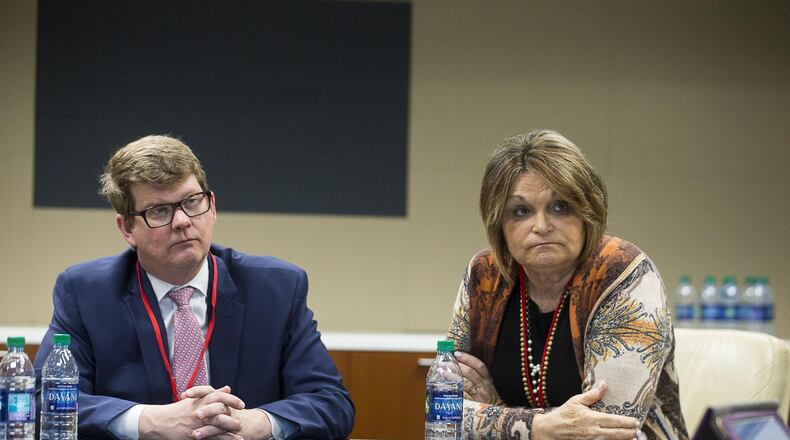MARTA general manager Jeffrey Parker said Tuesday he's cautiously confident that Gwinnett County's looming transit referendum will earn the endorsement of voters, and that his agency will be able to implement the suburb's ambitious plans alongside other significant transit projects in metro Atlanta.
“I don’t have a framework to say how people get out and vote on a Tuesday in March and how that outcome is driven,” Parker said during an exclusive interview with The Atlanta Journal-Constitution. “But I think what I’ve seen as I’ve moved around Gwinnett County is significant support for investing in infrastructure and investing in transit.”
VIDEO: More on MARTA
On Wednesday, less than a week before the March 19 referendum that could shape the transportation and economic development future of both Gwinnett and the entire metro Atlanta region, Parker sat down with the AJC's editorial board for the first time since taking over MARTA's reins one year ago. The looming referendum dominated much — but not all — of the wide-ranging conversation.
Parker put forth a vision of a connected metro Atlanta, with both increased transit options and more development built around existing rail stations.
If the Gwinnett referendum passes Tuesday, Doraville could be a prime candidate for one of these projects, Parker said, because parking utilization would likely decrease once a MARTA train station in Norcross was operational. Many Gwinnett County commuters currently use the Doraville station on their way into Atlanta and park at the station.
Credit: Alyssa Pointer, alyssa.pointer@ajc.com
Credit: Alyssa Pointer, alyssa.pointer@ajc.com
Despite some uncertainty as to whether pro-referendum voters make it to the polls on Tuesday in Gwinnett, Parker said he sees a healthy appetite for increased public transportation options throughout metro Atlanta, specifically citing bus rapid transit lanes along Ga. 400, for which $100 million in state funds has already been allocated. Fulton and DeKalb counties are both working on transit plans that could add new routes and options for residents. he said.
“There’s a lot of excitement about investing in more transit,” Parker told the newspaper’s editors and reporters.
“This region has created a deficit for itself both in roads and transit. We’re at this precipice now with transit trying to catch up with that.”
Thousands of Gwinnett residents have already cast early ballots in the county’s referendum. If it passes by the end of Election Day, Gwinnett’s pending contract with MARTA would be consummated and county residents and visitors would be committed to paying a new 1 percent sales tax until 2057.
The proceeds of that sales tax would help pay for a dramatic expansion of transit services in Gwinnett, including a five-mile rail extension from Doraville to Norcross; 50 miles of “bus rapid transit” lines; and other expansive additions to bus service.
MARTA would be tasked with making it all a reality — on top of significant expansion projects in the city of Atlanta and Clayton County and the agency's many other initiatives. It's a lot at one time, but Parker said MARTA will be ready.
“While we haven’t been doing expansion projects for 20 years, we have a pretty significant capital program going on,”he said. “Something I’ve committed to the board is to build an organization that’s going to be capable of doing this. And I have a high level of confidence that I’m bringing in the right people to do that.”
The transit agency recently hired new executives, including Frank Rucker, an engineer who worked on the $6 billion dollar capital improvement program at Hartsfield-Jackson International Airport. Rucker is a few weeks into his new job as MARTA's chief of capital programs.
When he took over, Parker inherited a stable financial situation that was a departure from much of MARTA’s history. When Parker’s predecesor, Keith Parker, took over in 2012, the agency was on the brink of insolvency and its spending under constant scrutiny. The two Parkers are not related.
MARTA has now run budget surpluses for six straight years, and Jeffrey Parker said Wednesday its his goal to keep the agency on a solid financial footing.
MARTA board chairwoman Freda Hardage, who also participated in Wednesday’s discussion with the AJC, said the fact that the agency hasn’t missed a deadline during its Clayton County expansion is further proof of its turnaround.
“The board is very focused on the fact that if we commit to expanding to any community, whatever that is, that we have to deliver,” she said.
EXCLUSIVE ACCESS
An editorial board meeting brings AJC journalists together with newsmakers, usually around a conference table at our offices. These meetings provide a valuable forum for a free-ranging discussion that almost always provides more details, depth and context than can be gained during a typical press conference with multiple media outlets in attendance.
The AJC has expanded the editorial board meeting concept to include news reporters, editors and photographers too. A reporter who attends a meeting may be assigned to produce a story for our readers. This story is a result of Wednesday’s editorial board meeting with MARTA General Manager and Chief Executive Officer Jeffrey A. Parker.
We believe the tradition of the editorial board meeting helps us live up to our daily quest to bring you an AJC that’s Credible, Compelling and Complete.
GWINNETT’S 2019 MARTA REFERENDUM
The ballot question: "Voters will see the ballot question phrased this way when they visit the polls: "Gwinnett County has executed a contract for the provision of transit services, dated as of August 2, 2018. Shall this contract be approved? YES __ NO __"
What it means: A yes vote would be a vote in support of ratifying Gwinnett's pending transit service contract with MARTA, allowing it to take over Gwinnett's current transit services and greatly expand them — including a possible rail extension into the Norcross area and an extensive bus system with diverse options.
A yes vote would also trigger a new 1 percent sales tax to pay for such projects. Purchases in Gwinnett are currently subject to 6 percent sales tax. The new countywide sales tax would remain in effect until 2057 and garner billions of dollars. Collected funds would be remitted to Gwinnett County, which would then write checks to MARTA for projects and operations.
Key dates: Election Day is March 19.
Advance in-person voting is underway at the Gwinnett elections office (455 Grayson Highway in Lawrenceville) and at seven satellite locations through Friday.
Voting hours are between 7 a.m. and 7 p.m. Satellite locations can be found at gwinnettcounty.com.
Election Day voting will take place at each of the county’s 156 regular voting precincts.
Keep Reading
The Latest
Featured





